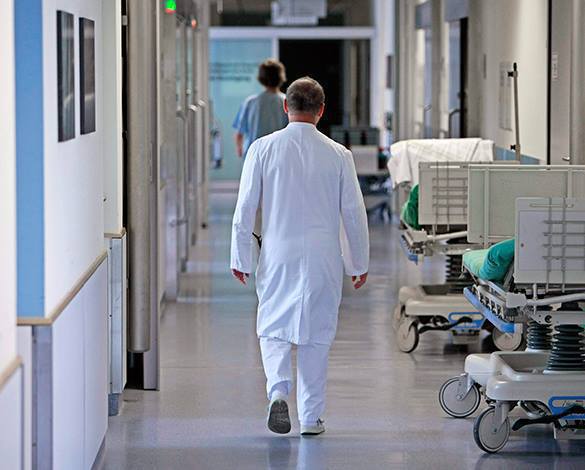Can Russia ban abortion?
More than 300,000 people, including Patriarch Kirill, have signed a petition to ban abortions in Russia. Pravda.Ru held an interview about the issue of abortions in Russia with an international expert on reproductive health in the territory of the Russian Federation, member of the Board of Trustees of "Mother Russia" movement, obstetrician, gynecologist, Candidate of Medical Sciences, Boris Lordkipanidze.

"Today, Russia raises the question about the withdrawal of abortions from mandatory health insurance (MHI). Are abortions free in Russia?"
"In Russia, abortion is free. The question about the withdrawal of abortion from the mandatory health insurance touches upon all types of abortions, except for abortion on medical grounds. This is a problem, because socially disadvantaged people will be deprived of the possibility to resort to this medical procedure.
"Should abortion is pulled out from the mandatory health insurance, citizens will have to pay for them. Those who will not be able to pay the amount that private health institutions ask for, they will most likely seek assistance from the people who have no medical education. In most cases, this trend will lead to disastrous consequences for the health of pregnant women."
"Is there any economic benefit from the withdrawal of abortion from mandatory health insurance? Is abortion an expensive surgery?"
"If this happens, the state will be able to save around five billion rubles. In relation to the fund of the mandatory health insuranceIn, this money is literally a drop in the sea. If some of those women, who choose to interrupt pregnancy, will go to unprofessional doctors, if abortion is removed from the mandatory health insurance system, they will go to stationary hospitals should they develop any complications afterwards.
"The treatment of gynecological pathology is a fixed service that is included in MHI standards, and it is much more expensive than abortion. In other words, it is highly likely that the amount of five billion that the government may try to save on abortions will be used on the subsequent treatment of complications after "illegal abortions."
"Why do we still have the problem of abortion? Why don't people use modern means of contraception that completely eliminates this problem?"
"In Russia, we have a very narrow system of education, and a low level of public awareness as far as this problem is concerned. In the West, this knowledge has been propagated since the 1960s, when contraceptive drugs appeared. Russia has traditionally had a controversial attitude to contraception.
"In the Soviet Union, abortion was treated as a routine procedure that was very simple for women. The problem of abortion had never been condemned in society, and this question had never been considered as a problem. As a result, abortion had become the most simple "means of contraception." The issue was regarded as a sole prerogative of women, and men were never responsible for the problem. We now deal with consequences of our reluctance to inform the population about methods of contraception and the harm of abortions. We do not have a culture of contraceptive behavior."
"Doctors say that the majority of women who make abortions already have children. Why can't they have an intrauterine device that we have known since the Soviet times? Or is it too expensive a procedure?"
"This is also a part of our irresponsibility. More than 50 percent of the population use the interrupted sexual intercourse technique, which is absolutely unreliable. Yet, those people prefer to rely on this method instead of going to the doctor to decide the most appropriate method of contraception and use recommendations, whether it is intrauterine devices, oral contraceptives or injectable contraceptives. One can make an injection once in every three months and live quite happily without worrying about pregnancy.
"One can use an intrauterine device that lasts for five years. In Russia, a patient only needs to buy the device, while the procedure to install it is free. Unfortunately, the Russians leave it all to chance before going to a doctor to interrupt pregnancy."
"The petition to ban abortions that has already collected about 300,000 signatures contains a clause on the prohibition of assisted reproductive technology, "an integral component of which is the humiliation of human dignity and the killing of children in early stages of their embryonic development." Does it go about the prohibition of IVF?"
"It does, but again, there are a lot of religious overtones here. Doctors take several eggs, then several of them are fertilized, but only one or two, most promising ones, are transferred into the uterus. The remaining eggs get frozen. In the past, doctors used to transfer, for example, three fertilised eggs into the uterus to receive one child. If all the three embryos would develop normally, doctors would destroy two embryos and keep only one. This technique is not used nowadays, as they transfer the maximum of two embryos now. All of this is a matter of science."
"What will happen if both abortions and IVF are banned in Russia?"
"For the time being, this is just a public initiative. The petition will need to receive a certain number of signatures before the government can consider it. I personally believe that this initiative will never materialise as there are many reasonable people in the government.
If Russia ever bans abortion, it will not be done on the basis of religion or a humane approach to human life. Russia stands on the brink of a demographic hole, and, given the vast territory of our country, one needs to maintain the number of people, who will live on this territory.
"Yet, even this cause is very doubtful. The abortion ban experience in 1936, during Stalin's time, demonstrated that the birth rate had increased, but then returned to the original level, before the growth of illegal abortions, infanticide and female deaths occurred."
Interviewed by Tatiana Traktina
Pravda.Ru
Read article on the Russian version of Pravda.Ru
Subscribe to Pravda.Ru Telegram channel, Facebook, RSS!


